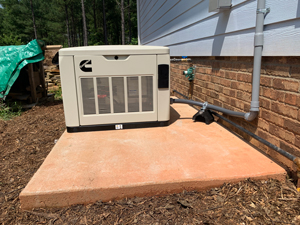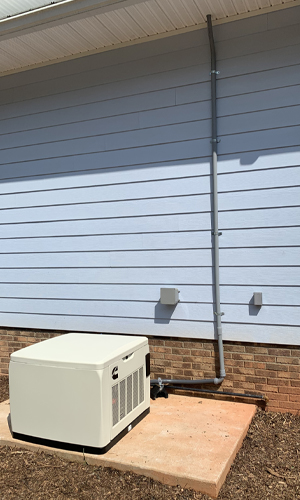Electrician blog
Disruptions to the power grid can come from many different sources – extreme weather events, domestic terrorism, or just an ill-placed car accident. When the grid goes down you can get caught in the dark, literally! However, with a whole house backup generator you don’t have to go softly into that good night and instead your home will be a beacon of welcome light.
Portable generators seem to be an easy answer to blackouts. After all, many people already have them for using at picnics or for weekend camping trips. However, portable generators suffer from three main shortcomings: a lack of capacity, troubling safety issues, and short run time.
When talking about capacity and generators, we’re talking about watt/hours. Common portable generators are only rated for a few thousand watts, enough to run a couple household appliances and not much else. There are high capacity portable generators available, but they too suffer from safety and run time issues.
Generators are capable of delivering life saving electricity, keeping your home warm in the winter, cool in the summer, and running vital equipment like refrigerators and CPAP machines. However, they need to be operated with care otherwise they pose a serious risk to your safety.
All generators emit carbon monoxide, a color, odorless gas which can build up in enclosed environments and lead to asphyxiation. The solution to this (only running the generator outdoors) brings with it its own problems.
If your portable generator is outside, the question now becomes how do you connect it to your vital appliances? The answer that most people jump to is: extension cords. This is fine for low-powered applications, but in a blackout situation most people will quickly overload their cords. Overloaded extension cords overheat, leading to electrocution and fire risks.
Finally, there is the fire risk from the generator itself. Most portable generators are not meant to be run continuously and may become dangerously hot if left running nonstop. Just look at any portable generator’s instructions and you’ll see that they advise you not to refill their fuel tank with the unit in operation due to the risk of fire! Definitely not an ideal solution for prolonged power outages!
OK. Let’s just assume you’ve got a high capacity portable generator and have safely connected it to your essential home appliances. How long will that generator last before you need to turn it off, allow it to cool, and then refill its gas tank? Well, on average you’re looking at 6 to 12 hours of continuous run time, with some premium models offering up to 18 hours.
This means that a portable generator might be able to last the night, after which time you’ll need to venture out into possibly dangerous weather conditions to turn off the generator, allow it to cool, and then refill it.
If you’re thinking that there must be a better solution, you’re not wrong.
First, let’s just get this out of the way. Whole house generators avoid each shortfall associated with portable gas generators:
They offer greater capacity, allowing you to operate your entire home like normal, completely skip the hassle and risks of extension cords, pose no risk of carbon monoxide poisoning, and can run continuously for days on end.
In addition to solving the problems of portable generators, whole house generators offer additional benefits:
It’s important to take a moment to consider your needs before choosing a new generator for your home. These are the factors you should assess before making your decision:
Choosing the right size generator is like choosing the right size air conditioner – bigger is not always better, and too small is going to be a problem. The goldilocks size is your goal: big enough to power your entire house under adverse weather conditions.
Since your HVAC system is your home’s biggest consumer of electricity, homes in extremely hot or cold environments will require higher wattage generators. The next biggest factors to consider are the square footage of your house, how many kitchen appliances you have, and whether or not you have any high power usage equipment like well sump pumps.
FAW, a major supplier of home standby generators, has an online calculator which helps homeowners determine what size generator will work best for their needs.

One major advantage of whole home generators is that you have a variety of choices of fuel type. Regardless of what you choose, standby generators almost always will be able to provide you with up to a week of uninterrupted power.
When most people think of backup generators, the first fuel that comes to mind is diesel. Diesel generators are generally relatively affordable, although diesel fuel has become costly in recent years. One major downside of diesel generators for residential use is that they tend to be quite loud when in use.
Propane is another common fuel source for generators and has many advantages. Propane is extremely clean burning and lasts almost indefinitely in storage. In terms of cost it tends to be slightly cheaper than diesel per kilowatt/hour, although due to diesel’s greater energy density a similarly sized propane tank will exhaust itself sooner.
Natural gas is one of the best whole house generator fuel options available as long as your home is already hooked up to a natural gas line. In the vast majority of cases, when the power goes out natural gas connections remain functioning. This means that a natural gas-powered generator will be able to provide power without worrying about tanks to refill.
Not only do you not have any tanks to fill, the fuel itself is extremely efficient, clean burning, and affordable.
The biggest downside to natural gas is the installation costs generally are higher than propane or diesel powered options and the natural gas plumbing connections need to be installed by a qualified professional.
Outside of choosing the right generator, you will need to address some additional installation-specific concerns. The good news is that a qualified electrician will be able to help you make most of these decisions. All the same, it is important to be aware of these choices before jumping into this project.

Before adding a generator to your home it is important to first check that your choice will comply with local building codes and homeowners association regulations if applicable.
Permitting will vary by city, so it is hard to make generalizations. Generally a local electrician with experience installing generators will have a good idea of what sort of state and city regulations you will need to comply with.
When choosing a site for a whole home generator it is important to first and foremost comply with local regulations. Generally generators will be required to be placed on a base of some sort. Usually these bases are concrete pads, although in flood prone regions elevated bases may be required.
Further you need to have sufficient clearance for the generator’s exhaust. Overhanging limbs, awnings, or even encroaching bushes and shrubs should be avoided.
Finally, choose a location that has relatively easy access for fueling and maintenance, whether that be proximity to your natural gas line or for refilling by truck. This can save yourself significantly in installation costs and future generator maintenance headaches.
Adding a whole house generator is a great upgrade that will protect you against blackouts. Unlike a portable generator, whole home generators are safer, easier to use, longer lasting, and offer far more power generation. You’ll be able to go about life like normal, even when the rest of your neighborhood is plunged into darkness.
Choosing the right type of generator isn’t a small decision, but a reputable local electrician will be able to help you make the right choices. Resist the temptation to try to DIY this sort of project, as adding a generator to your home is an involved process that requires expertise across a variety of different fields.
If you’re ready to start the process of adding a generator to your home Rytec Electric has extensive experience installing generators across Western Cape – Cape Town, Gauteng – Johannesburg, Kwazulu Natal – Durban